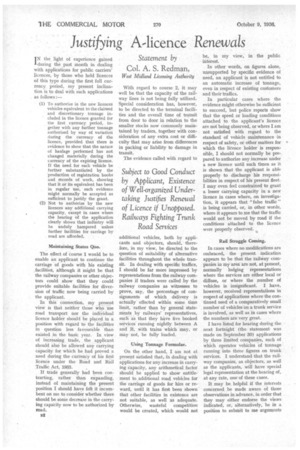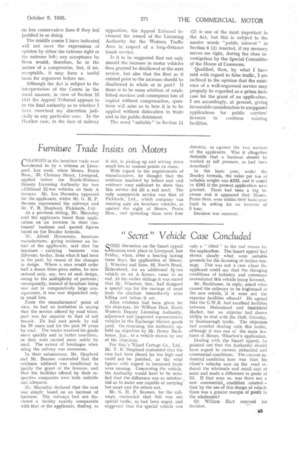.Justifying. .A4icetice Renewals
Page 36

Page 37

If you've noticed an error in this article please click here to report it so we can fix it.
Statement by Col. A. S. Redman,
West Midland Licensing Authority I N the light of experience gained during the past month in dealing with applications for public carriers' licences, by those who held licences of this type during the first full currency period, my present inclination is to deal with such applications as follows :— (1) To authorize in the new licences vehicles equivalent to the claimed and discretionary tonnage included in the licence granted for the first currency period, together with any further tonnage authorized by way of variation during the currency of the licence, provided that there is evidence to show that the nature of haulage performed has not changed materially during the currency of the expiring licence. If the need for each vehicle be further substantiated by the production of registration books and records of work, showing that it or its equivalent has been in regular use, such evidence might normally be accepted as sufficient to justify the grant.
(2) Not to authorize by the new licences any additional carrying capacity, except in cases where the hearing of the application clearly shows that industry will be unduly hampered unless further facilities for carriage by . road are afforded.
Maintaining Status Quo.
The effect of course 1 would be to enable an applicant to continue the carriage of goods with his existing facffitieS, although it might be that the railway companies or other objectors could show that they could provide suitable facilities for diversion of traffic now being carried by the applicant.
In this connection, my present view is that neither those wilà. use road transport nor the individual licence holder should be placed in a position with regard to the facilities in question less favourable than existed in the basic year. In view of increasing trade, the applicant should also be allowed any carrying capacity for which he had proved a need during the currency of his first licence under the Road and Rail Traffic Act, 1933.
If trade generally had been contracting, rather than expanding, instead of maintaining the present position I should have felt it incumbent on me to consider whether there should be some decrease in the carrying capacity now to be authorized by road.
With regard to course 2, it may well be that the capacity of the railway fines is not being fully utilized. Special consideration has, however, to be directed to the terminal facilities and the overall time of transit from door to door in relation to the smaller stocks now commonly maintained by traders, together with consideration of any extra cost or difficulty that may arise from differences in packing or liability to damage in transit.
The evidence called with regard to
additional vehicles, both by applicants and objectors, should, therefore, in my view, be directed to the question of suitability of alternative facilities throughout the whole transit. In dealing with specific traffics, I should be far more impressed by representations from the railway companies if traders were called by the railway companies as witnesses to prove, say, the percentage of consignments of which, delivery is actually effected within some time limit, rather than by general statements by railways' representatives, such as that they have five booked Services. running nightly between A and B, with trains which may, or may not, be fully loaded.
Using Tonnage Formulae.
On the other hand, I am not at present satisfied that, in dealing with applications, for any_ increase in carrying capacity, any arithmetical factor should be applied to show entitlement to additional road vehicles for the carriage of goods for hire or reward, until it has first been shown that other facilities in existence are not suitable, as well as adequate. Otherwise, wasteful competition would be created, which would not be, in my view, in the public interest.
In other words, on figures alone, unsupported by specific evidence of need, an applicant is not entitled to an automatic increase of tonnage, even in respect of existing customers and their traffics.
In particular cases where the evidence might otherwise be sufficient to succeed, but police reports show that the speed or loading conditions attached to the applicant's licence are not being observed, or where I am not satisfied with regard to the standard of vehicle maintenance in respect of safety, or other matters for which the licence holder' is responsible, I should not normally be prepared to authorize any increase under a new licence until such times as it is shown that the applicant is able properly to discharge his responsibilities in respect of his present fleet. I may even feel constrained to grant a lesser carrying capacity in a new licence in cases where, on investigation, it appears that "false traffic" is being carried, or, in other words, where it appears to me that the traffic would not be moved by road if the conditions attached to the licence were properly observed.
Rail Struggle Coming.
In cases where no modifications are embraced, the present indication appears to be that the railway companies in my area are not, at present, normally lodging representations where the services are either local or diffuse, or where the number of vehicles is insignificant. I have, however, received representations in respect of applications where the continued used of a comparatively small number of vehicles on a trunk service is involved, as well as in cases where the numbers are very great.
I have listed for hearing during the next fortnight (the statement was made on September 30) applications by three limited ccimpanies, each of which operates vehicles Of tonnage running info three figures on trunk services. I understand that the railway companies, as objectors, as well as the applicants, will have special legal representation at the hearing of, at any rate, one' of these cases.
It may be helpful if the interests concerned be made aware of these observations in advance, in order that they may either endorse the views indicated, or, alternatively, be in a position to submit to me arguments on less conservative lines if they feel justified in so doing.
The middle course I have indicated will not meet the expressions of opinion by either the extreme right or the extreme left ; any acceptance by them would, therefore, be in the nature of a compromise, but, if unacceptable, it may form a useful basis for argument before me.
Although the Act is subject to the interpretation of the Courts in the usual manner, in view of Section 15 (14) the Appeal Tribunal appears to be the final authority as to whether I have exercised my discretion judicially in any particular case. In the Hawker case, in the face of railway
opposition, the Appeal Tribunal increased the award of the Licensing Authority for the Western Traffic Area in respect of a long-distance trunk service.
Is it to be suggested that not only should the increase in motor vehicles then granted be disallowed at the next review, but also that the fleet as it existed prior to the increase should be disallowed in whole or in part? If there is to be some attrition of established services and consequent loss of capital without compensation, questions will arise as to how it is to be applied without dislocation in trade and to the public detriment.
The word "suitable" in Section 11 (2) is one of the most important in the Act, but this is subject to the master words "public interest" in Section 6 (2) inserted, if my memory serves me right, during the close investigation by the Special Committee of the House of Commons.
then, by what I have said with regard to false traffic, I am inclined to the opinion that the existence of a well-organized service may properly be regarded as a prima facie case for the grant of an application. I am accordingly, at present, giving favourable consideration to unopposed applications for public carriers' licences to continue existing facilities.




























































































